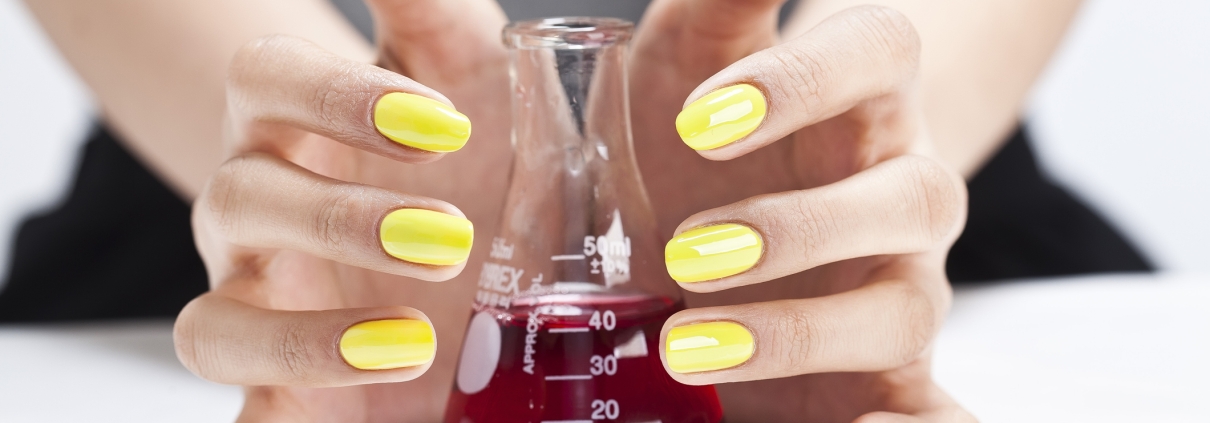The Effects of Chemicals on Nails
Nails are not only a crucial aspect of our grooming but also a reflection of our overall health. However, our nails are constantly exposed to various chemicals through daily activities, personal care products, and environmental factors. Understanding the effects of these chemicals on nails is essential for maintaining their health and preventing damage. This article explores how different chemicals impact nail health and offers tips for mitigating these risks.
Common Chemicals and Their Effects on Nails
1. Nail Polish and Removers
Nail Polish
Nail polishes often contain chemicals like formaldehyde, toluene, and dibutyl phthalate (DBP).
Formaldehyde: Used as a hardening agent, it can cause nail brittleness and peeling with prolonged use.
Toluene: Helps nail polish glide on smoothly but can lead to dry, cracked nails and irritation.
Dibutyl Phthalate (DBP): Used to add flexibility, but prolonged exposure can cause yellowing and weakening of the nails.
Nail Polish Removers
Most nail polish removers contain acetone or non-acetone solvents.
Acetone: Highly effective at removing polish but extremely drying to the nails and cuticles, leading to brittleness and splitting.
Non-Acetone Removers: Gentler but still capable of causing dryness and weakening if used frequently.
2. Household Cleaners
Household cleaners, such as detergents, bleach, and disinfectants, contain harsh chemicals that can strip moisture from nails and skin.
Detergents: Often contain surfactants that dry out nails, making them prone to breakage.
Bleach: Extremely drying and can cause nails to become brittle and discolored.
Disinfectants: Alcohol-based cleaners can dehydrate nails and surrounding skin, leading to peeling and splitting.
3. Hair Care Products
Shampoos, conditioners, and styling products can also impact nail health due to their chemical content.
Sulfates: Found in many shampoos, sulfates can strip moisture from nails, causing dryness.
Alcohols: Common in styling products, alcohol can lead to dehydration of nails and cuticles, resulting in brittleness.
4. Skin Care and Cleaning Agents
Frequent hand washing with antibacterial soaps and the use of sanitizers can affect nail health.
Antibacterial Soaps: Contain triclosan and other drying agents that can strip nails of their natural oils.
Hand Sanitizers: High alcohol content can cause significant dehydration of nails and skin, leading to cracking and splitting.
Mitigating the Risks: Tips for Protecting Nail Health
1. Choose Nail Products Wisely
Opt for Non-Toxic Polishes: Look for “3-free” or “5-free” nail polishes that do not contain formaldehyde, toluene, or DBP.
Use Gentle Removers: Limit the use of acetone-based removers. Opt for non-acetone removers or those specifically formulated to be gentler on nails.
2. Protect Your Hands
Wear Gloves: Always wear gloves when using household cleaners or engaging in activities that expose your hands to chemicals. This reduces direct contact and protects your nails.
Moisturize Regularly: Apply hand cream or cuticle oil after washing hands, using hand sanitizer, or removing nail polish to restore moisture.
3. Maintain a Healthy Nail Care Routine
Limit Exposure: Reduce the frequency of nail polish application and remover use to give your nails a break.
Hydrate Nails: Use moisturizing treatments and nail strengtheners regularly to keep nails hydrated and resilient.
Avoid Biting or Picking: Refrain from biting your nails or picking at nail polish, as this can lead to further damage and exposure to harmful chemicals.
4. Choose Gentle Hair and Skin Products
Sulfate-Free Shampoos: Opt for sulfate-free hair care products to minimize drying effects on your nails.
Alcohol-Free Products: Use alcohol-free hand sanitizers and skin care products to prevent dehydration of nails and cuticles.
5. Regular Nail Care
Trim and File: Regularly trim and file your nails to keep them strong and prevent snagging.
Healthy Diet: Ensure your diet includes nutrients essential for nail health, such as biotin, vitamins A, C, and E, and minerals like zinc and iron.
Conclusion
Chemicals are a pervasive part of our daily lives, and their impact on nail health cannot be underestimated. Understanding the effects of these chemicals and taking proactive steps to protect your nails is essential for maintaining their health and appearance. By choosing non-toxic products, protecting your hands, maintaining a healthy nail care routine, and using gentle hair and skin care products, you can mitigate the risks posed by chemical exposure and enjoy strong, healthy nails. Prioritizing nail health is not only a matter of aesthetics but also an integral part of overall well-being.





